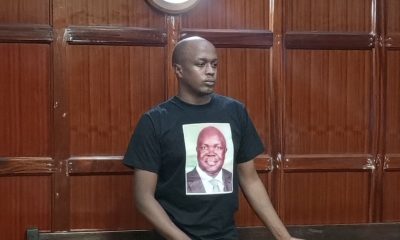News
“I Tried to Kill Myself”: Former Prison Guard Turned Activist Cop Shakur’s Descent Into Debt and Despair
The 42-year-old, who rose to fame during the 2024 anti-Finance Bill protests, revealed he is at his “lowest moment,” facing an arrest warrant and unable to provide for his daughter, all while grappling with the aftermath of business failures and personal betrayals.

Former prison officer reveals suicide attempts, million-shilling debt, and broken marriage after sacrificing government job for Gen Z protests
Jackson Kihara, the ex-prison officer known as Cop Shakur who became an icon of Kenya’s 2024 anti-government protests, has opened up about hitting rock bottom—revealing crushing debt, multiple suicide attempts, and the devastating personal cost of his activism.
In a raw, emotional video that has shaken social media, the 42-year-old activist spoke from a disheveled room, his voice breaking as he detailed how life spiraled downward after business failures, betrayal, and mental health collapse left him unable to provide for his young daughter.
From Uniformed Rebel to Dismissed Activist
Shakur catapulted to national prominence in June 2024 when, still in his Kenya Prisons Service uniform, he joined Gen Z-led demonstrations outside Parliament, openly condemning police brutality and President William Ruto’s government policies. His defiance was unprecedented—a serving prison officer stationed at Kamiti Maximum Security Prison publicly turning against his own employer.
The consequences were swift. Shakur faced intense intimidation from colleagues who allegedly locked him inside the prison and denied him lunch breaks. By July 2024, he was interdicted, and his dismissal followed shortly after.
But Shakur insists his current crisis isn’t about losing that job. “After losing my job illegally because of my activism—something I’ll never regret standing for—I had actually planned myself well. What I’m going through now has nothing to do with losing that job. Things got worse later because of the businesses I invested in,” he explained in the viral video.

Cop Shakur, a former Kenya Prisons Service officer and prominent activist, has laid bare his struggles with overwhelming debt, property auctions, and severe mental health challenges.
When Everything Falls Apart
Post-dismissal, Shakur pivoted to entrepreneurship, launching a car-hire business and organizing events. But disaster struck in December 2024 when an outdoor event he had invested heavily in was destroyed by torrential rains, causing massive losses. Shortly after, his vehicles began suffering accidents and mechanical breakdowns.
“I’ve been surviving through events and my car hire business, but last year in December, I organized an event that failed badly because of the rain. I lost a lot of money. My cars also got into accidents and others broke down. That’s how I ended up deep in debt over 1 million shillings,” Shakur recounted.
The debt now exceeds KSh 1 million. His property has been auctioned, and he faces an arrest warrant. “I’m in debt, I’ve been auctioned, I have an arrest warrant against me, and I can’t pay my bills or provide for my daughter,” he said tearfully.
Betrayal, Heartbreak, and the Darkest Moments
The financial devastation was compounded by profound personal trauma. Shakur revealed discovering his ex-wife in bed with his best friend—in his own home. While accepting partial responsibility for the marriage breakdown, he admitted the betrayal pushed him to the edge.
“My mental health struggles started after my ex-wife cheated on me with my best friend on my own bed. I found them. That moment broke me completely. But I don’t blame her, because I wasn’t there for her. I take responsibility for my part in how things fell apart,” he said.
What followed was a descent into suicidal despair. “There was a time I felt so hopeless that I tried to take my own life not once, but several times. I swallowed pills, tried to suffocate myself, even tried hanging—but every time, I woke up. Maybe God wasn’t done with me yet.”
A Father’s Determination
Despite feeling like a “failure,” Shakur emphasized his determination to survive for his daughter. In his appeal, he asked for any work opportunities—as a security bouncer, driver, or any legitimate employment—to rebuild his shattered life.
“I don’t blame anyone. I just want to rebuild for my daughter, and for myself,” he said.
**The Price of Activism**
Shakur’s troubles haven’t been limited to personal struggles. In January 2025, he was arrested and charged with publishing false information under the Computer Misuse and Cyber Crime Act after allegedly disseminating misleading content on his X account. He was released on KSh 50,000 bail. He has faced multiple arrests and detentions, with authorities seeking up to 21 days of detention for investigations.
The activist briefly aligned with the Fighting Brutality and Impunity (FBI) movement—a collective of former security officials combating police excesses—before parting ways in August 2025 to pursue his principles independently.
In May 2025, Shakur announced plans to sue the government over his dismissal, arguing that his activism and criticism of government policies led to his illegal firing.
A Nation Responds
Shakur’s story has struck a chord across Kenya, highlighting systemic issues within the country’s security services and the often-invisible toll on those who dare to speak truth to power. Social media has erupted with messages of solidarity, financial support offers, and calls for comprehensive mental health services.
His candid revelation arrives as Kenya grapples with rising cases of mental health crises among security personnel, including stress, substance abuse, and suicide.
As Shakur sits in that cluttered room, a single father at his lowest point, his message resonates beyond personal tragedy. It’s a stark reminder of what happens when society celebrates activists in their moment of defiance but forgets them when the cameras stop rolling.
For those struggling with suicidal thoughts, help is available through Kenya’s mental health helplines and organizations specializing in crisis intervention.
Kenya Insights allows guest blogging, if you want to be published on Kenya’s most authoritative and accurate blog, have an expose, news TIPS, story angles, human interest stories, drop us an email on [email protected] or via Telegram
-

 Investigations2 weeks ago
Investigations2 weeks agoInside Nairobi Firm Used To Launder Millions From Minnesota Sh39 Billion Fraud
-

 News2 weeks ago
News2 weeks agoPastor James Irungu Collapses After 79 Hours Into 80-Hour Tree-Hugging Challenge, Rushed to Hospital
-

 Business2 weeks ago
Business2 weeks agoMost Safaricom Customers Feel They’re Being Conned By Their Billing System
-

 News2 weeks ago
News2 weeks agoUnfit for Office: The Damning Case Against NCA Boss Maurice Akech as Bodies Pile Up
-

 News2 weeks ago
News2 weeks agoTax Payers Could Lose Millions in KWS Sh710 Insurance Tender Scam As Rot in The Agency Gets Exposed Further
-

 News2 weeks ago
News2 weeks agoDeath Traps: Nairobi Sitting on a Time Bomb as 85 Per Cent of Buildings Risk Collapse
-

 News2 weeks ago
News2 weeks agoRaila Bodyguard Maurice Ogeta Appointed As Mombasa Security County Adviser
-

 Investigations6 days ago
Investigations6 days agoKERRA Homa Bay Region Manager Calvince Thomas Accused of Swindling Businessman Ksh 2 Million in Phantom Tender Deal
























